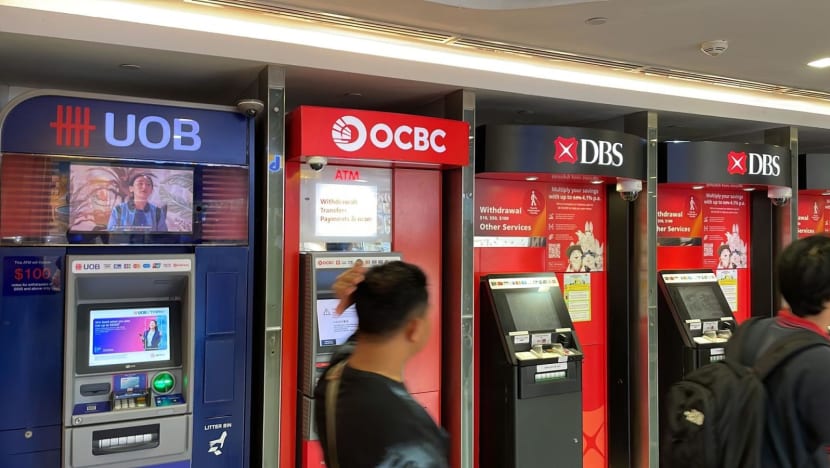Commentary: Low interest rates of ‘money lock’ are a disservice to bank customers
Considering how Singapore is a prime target for scammers, it is disappointing that bank customers are being asked to choose between security and higher interest rates, says finance blogger Dawn Cher.

UOB, OCBC and DBS ATMs at Bugis Junction. (File photo: OCBC)

This audio is generated by an AI tool.
SINGAPORE: After victims lost hundreds of millions to scammers in recent years, Singapore banks introducing a “money lock” feature felt like a step in the right direction.
When it was shared in parliament in September 2023, the premise seemed simple enough: Money lock would allow customers to set aside an amount in their bank accounts that cannot be digitally transferred out without strict identity verification.
No one said anything about having to settle for a lower interest rate. Some netizens expressed dismay on online forums when Singapore’s three local banks revealed lower-than-ideal interest rates to be earned on locked funds.
Depending on which bank your funds are in, your experience of locking up your money to protect it from scammers will differ.
DBS and UOB customers will need to open a new, separate account, while OCBC customers can simply lock up funds within their existing accounts.
For DBS customers, this is done through digiVault, which is a standalone account with added security where deposited funds cannot be digitally transferred out. To access locked funds, one will need to personally visit a DBS or POSB branch to verify their identity first.
UOB customers have to similarly open up a separate account called UOB LockAway to activate this additional security, while unlocking it requires visiting a UOB bank branch with their NRIC or passport.
OCBC has taken a different approach. Customers can activate Money Lock on their existing OCBC accounts and select the amount they wish to lock up. If they change their mind or need to unlock some cash, they can do so at an OCBC ATM with their bank card without having to queue up physically at a bank branch.HOW MUCH INTEREST LOCKED FUNDS EARN
OCBC is the only bank where customers will continue to earn the same interest whether their funds are locked up or not, since the locked funds are aggregated with the rest of the funds to calculate the interest earned on the account. There is thus no change to how much the customer would earn regardless of if they choose to lock up their funds.
DBS is currently offering a promotional interest rate of 1.8 per cent (capped at S$50,000 per customer) for three months for anyone who opens a digiVault before Feb 29. That sounds good, but it lasts only for three months and then drops back to the standard 0.05 per cent per annum afterwards.
In contrast, customers could get higher rates if they keep their funds in DBS Multiplier (up to 4.1 per cent per annum) or POSB Save As You Earn (3.5 per cent per annum).
Similarly, UOB is currently giving 1 per cent interest on the first S$20,000 funds locked in the UOB LockAway account, but that will end on Mar 31, after which it will fall back down to 0.05 per cent per annum.
While UOB LockAway offers up to 5 per cent interest depending on the amount saved, the interest rates are tiered so customers will not earn the full 5 per cent on their entire sum.
Considering that one can currently earn up to 7.8 per cent per annum on the UOB One account, the rates on LockAway are not as enticing.THE CHOICE BETWEEN ANTI-SCAM SECURITY AND HIGHER INTEREST
DBS Multiplier, OCBC 360 and UOB One are what most of us in the personal finance space refer to as “high yield savings accounts”.
And as a customer of all three banks, I keep the majority of my funds in each of these three accounts for the simple reason that it pays me more interest than any other account in the same bank would.
The money lock feature makes me wonder why I need to choose between keeping my funds in my existing accounts and earning a higher interest rate, or moving it into a scammer-proof account and settling for a significantly lower rate.
I can’t say I’m happy with the latter, which is why I opted to lock my funds only in OCBC since it does not require me to give up any bonus interest that I’m already earning.
Interestingly, it seems that I’m not the only one with such reservations: Out of the 38,000 bank accounts that have reportedly activated money lock, OCBC customers make up 33,000 accounts.
Considering how Singapore is a prime target for scammers and that millions are being lost to scammers each month, it is disappointing that customers are being asked to choose between tighter security and higher interest rates.
Should we secure our funds but settle for a lower interest payout, or ignore the money lock feature entirely and continue collecting the usual interest on our existing high yield savings accounts?
The customer will have to decide, but it isn’t a pleasant decision.
Dawn Cher, also known as SG Budget Babe, runs a popular blog on personal finance and has a licence in real estate.

















